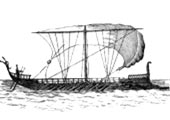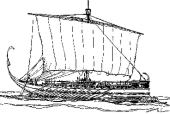|
 Carta a un desterrado. Claribel Alegría:
Carta a un desterrado. Claribel Alegría:
Mi querido Odiseo:
Ya no es posible más
esposo mío
que el tiempo pase y vuele
y no te cuente yo
de mi vida en Itaca.
Hace ya muchos años
que te fuiste
tu ausencia nos pesó
a tu hijo
y a mí.
Empezaron a cercarme
pretendientes
eran tantos
tan tenaces sus requiebros
que apiadándose un dios
de mi congoja
me aconsejó tejer
una tela sutil
interminable
que te sirviera a ti
como sudario.
Si llegaba a concluirla
tendría yo sin mora
que elegir un esposo.
Me cautivó la idea
que al levantarse el sol
me ponía a tejer
y destejía por la noche.
Así pasé tres años
pero ahora, Odiseo,
mi corazón suspira por un joven
tan bello como tú cuando eras mozo
tan hábil con el arco
y con la lanza.
Nuestra casa está en ruinas
y necesito un hombre
que la sepa regir
Telémaco es un niño todavía
y tu padre un anciano
preferible, Odiseo
que no vuelvas
los hombres son más débiles
no soportan la afrenta.
De mi amor hacia ti
no queda ni un rescoldo
Telémaco está bien
ni siquiera pregunta por su padre
es mejor para ti
que te demos por muerto.
 Sé por los forasteros
Sé por los forasteros
de Calipso
y de Circe
aprovecha Odiseo
si eliges a Calipso
recuperarás la juventud
si es Circe la elegida
serás entre sus chanchos
el supremo.
Espero que esta carta
no te ofenda
no invoques a los dioses
será en vano
recuerda a Menelao
con Helena
por esa guerra loca
han perdido la vida
nuestros mejores hombres
y estás tú donde estás.
No vuelvas, Odiseo
te suplico.
Tu discreta Penélope
(Claribel Alegría)
Hablando con Oliver Lou. Antonio María Flórez:
Cintura de agua, crepúsculo de arena,
algunas barcas dormitan la luz
de los pescadores ausentes
que beben en el puerto
su sueño de mujeres y licor;
entre ellos tú, abstraído en la nada,
no alcanzas a escucharme.
Después tu memoria
caerá en un charco
y dirás que Itaca
es un lejano puerto
al que nunca se puede llegar.
(La Ciudad. A.M.Flórez)
 Ultima entrevista. Cristina Peri Rossi:
Ultima entrevista. Cristina Peri Rossi:
[...]
Iba a soñar contigo -en una ciudad extraña-,
donde sólo un viejo submarino alemán
se perdió.
Iba a escribirte cartas que no te enviaría
y tú, ibas a esperar mi regreso
-Penélope infiel- con ambigüedad,
sabiendo que mis cortos regresos
no serían definitivos. No soy Ulises. No conocí
Itaca. Todo lo que he perdido.
(Inmovilidad de los barcos. C.Peri Rossi)
Nunca desayunaré en Tiffany... Manuel Vázquez Montalbán:
Nunca desayunaré en Tiffany
ese licor fresa en ese vaso
Modigliani como tu garganta
nunca
aunque sepa los caminos
llegaré
a ese lugar del que nunca quiera
regresar
una fotografía, quizá
una sonrisa enorme como una ciudad
atardecida, malva el asfalto, aire
que viene del mar
y el barman
nos sirve un ángel blanco, aunque
sepa los caminos nunca encontraré
esa barra infinita de Tiffany
el juke-box
donde late el último Modugno ad
un attimo d'amore che mai piu ritornera...
y quizá todo sea mejor así, esperado
porque al llegar no puedes volver
a Itaca, lejana y sola, ya no tan sola,
ya paisaje que habitas y usurpas
nunca,
nunca quiero desayunar en Tiffany, nunca
quiero llegar a Itaca aunque sepa los caminos
lejana y sola.
(M.Vázquez Montalbán)
Fábula. J.M.Caballero Bonald:
Nunca serás ya el mismo que una vez
convivió con los dioses.
Tiempo
de benévolas puertas entornadas,
de hospitalarios cuerpos, de excitantes
travesías fluviales y de fabulaciones.
Tiempo magnánimo
compartido también con semidioses
errabundos y hombres de mar que alardeaban
del decoro taimado de los héroes.
Qué ha quedado, oh Ulises, de esa vida.
La historia es indulgente, merecidas las dádivas.
Los dioses son ya pocos y penúltimos.
Justos y pecadores intercambian sus sueños.
(José Manuel Caballero Bonald, de Diario de Argónida)
Ithaka. Joseph Brodsky:
To return here after twenty years,
to find barefoot in the sand your own foot prints
and the mongrel dog’s barking fills the entire wharf
not because he is happy but because he has gone wild.
If you wish to, throw off those rags soaked in sweat
but the servant who can recognize your scar is dead,
and the one, they say, who waited for you
is nowhere to be found for she put out for everybody.
Your son has grown tall: he is a sailor himself
and he looks at you as if you were scum.
And the language they all shout in
is a futile labor, it seems, to decipher.
Whether it’s not that island or it is indeed
because you drowned your eye in blueness,
your eye because fastidious:
from the patch of earth, it seems, the waves will
not forgot the horizon, dashing on.
 Odysseus to Telemachus. Joseph Brodsky:
Odysseus to Telemachus. Joseph Brodsky:
My Telemachus,
The Trojan War is over. Who was the victor? I do not recall.
It might have been the Greeks: only the Greeks
could have forsaken so many corpses so far from home ...
But still the way leading home
turned out to be too long,
as if Poseidon had stretched the space
while we were wasting time.
I don’t know where I am,
What I behold in front of me. Some squalid island,
bushes, little buildings, pigs snorting,
an overgrown garden, some queen,
grass and stones . . . My darling Telemachus,
all islands look just the same,
when you have been wandering so long, and your mind
trips by counting the waves,
your eye, soiled by sea horizon, weeps,
and water’s flesh stuffs your ears.
I don’t recall how the war turned out.
And how old you are I don’t recall.
Grow up, my Telemachus, grow strong.
Only the gods know if we’ll see each other again.
Still now you are not any longer that baby
In front of whom I restrained the bullocks.
If it were not for Palamedes, we would have been together,
But perhaps, he was right: without me
You are safe from Oedipus’ passions,
and your dreams, my Telemachus, are sinless.
trans.: Zara M. Torlone
 Ithaka. Louise Gluck:
Ithaka. Louise Gluck:
The beloved doesn't
need to live. The beloved
lives in the head. The loom
is for the suitors, strung up
like a harp with white shroud-thread.
He was two people.
He was the body and voice, the easy
magnetism of a living man, and then
the unfolding dream or image
shaped by the woman working the loom
sitting there in a hall filled
with literal-minded men.
As you pity
the deceived sea that tried
to take him away forever
and took only the first,
the actual husband, you must
pity these men: they don't know
what they're looking at;
they don't know that when one loves this way
the shroud becomes a wedding dress.
Circe's power. Louise Gluck:
I never turned anyone into a pig.
Some people are pigs; I make them
look like pigs.
I'm sick of your world
that lets the outside disguise the inside.
Your men weren't bad men;
undisciplined life
did that to them. As pigs
under the care of
me and my ladies, they
sweetened right up.
Then I reversed the spell,
showing you my goodness
as well as my power. I saw
we could be happy here,
as men and women are
when their needs are simple. In the same breath,
I foresaw your departure,
your men with my help braving
the crying and pounding sea. You think
a few tears upset me? My friend,
every sorceress is
a pragmatist at heart; nobody
sees essence who can't
face limitation. If I wanted only to hold you
I could hold you prisoner.
Odysseus' decision. Louise Gluck:
The great man turns his back on the island.
Now he will not die in paradise
nor hear again
the lutes of paradise among the olive trees,
by the clear pools under the cypresses. Time
begins now, in which he hears again
that pulse which is the narrative
sea, at dawn when its pull is strongest.
What has brought us here
will lead us away; our ship
sways in the tinted harbor water.
Now the spell is ended.
Give him back his life,
sea that can only move forward.
Reunion. Louise Gluck:
When Odysseus has returned at last
unrecognizable to Ithaca and killed
the suitors swarming the throne room,
very delicately he signals Telemachus
to depart: as she stood twenty years ago,
he stands now before Penelope.
On the palace floor, wide bands of sunlight turning
from gold to red. He tells her
nothing of those years, choosing to speak instead
exclusively of small things, as would be
the habit of a man and woman long together:
once she sees who he is, she will know what he's done.
And as he speaks, ah,
tenderly he touches her forearm.
Penelope's despair. Yannis Ritsos:
Not that she didn't recognize him in the fireside light; nor was it
the beggar's rags, the disguise; no: transparent signs -
the scarred knee, the sturdiness, the craftiness in the eye. Startled,
leaning he back against the wall, she sought some justification,
a short reprieve from having to respond,
and be betrayed. Were twenty years wasted for him then?
Twenty years of dreams and anticipation, for this wretch,
these white whiskers soaked in blood? She sank mute onto a chair,
slowly she gazed at the slaughtered suitors on the floor, as if seeing
her own muffled aspirations. And she uttered, "Welcome,"
heeding her own strange and distant voice. In the corner her loom
veiled the ceiling in trelliswork shadows; and those birds, woven
against green foliange in striking red year, suddenly
turned black and gray on this homecoming night,
hovering in the unbroken sky of her final perseverance.
The Argonauts. D. H. Lawrence:
They are not dead, they are not dead!
Now that the sun, like a lion, licks his paws and goes slowly down the hill;
now that the moon, who remembers and only cares
that we should be lovely in the flesh, with bright, crescent feet,
pauses near the crest of the hill, climbing slowly, like a queen
looking down on the lion as he retreats.
Now the sea is the Argonauts' sea, and in the dawn
Odysseus calls the commands, as he steers past those foamy islands
wait, wait, don't bring the coffee yet, nor the pain grill...
The dawn is not off the sea, and Odysseus' ships
have not yet passed the islands, I must watch them still.
|